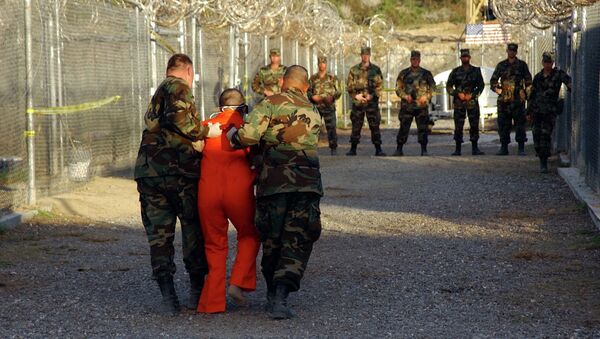“I have only written what I experienced, what I saw, and what I learned first-hand. I have tried not to exaggerate, nor to understate. I have tried to be as fair as possible to the US government, to my brothers, and to myself,” writes Mohamedou Ould Slahi near the end of his book. The manuscript was expected to have been completed in 2005, but it was only in 2012 that his attorneys managed to clear it as unclassified. It took another three years to turn it into the book that was finally released on January 20, 2015.
“We will all be free to see the Guantanamo Diary for what it ultimately is: an account of one man’s odyssey through an increasingly borderless and anxious world,” editor of “Guantanamo Diary” and author of his own book, “The Torture Report” Larry Siems told Sputnik.
"Whenever you start to torture me, I’m not gonna say a single word"– Mohamedou Ould Slahi, Guantanamo Diary
The author doesn’t come off as your average terrorist. Not only is he intelligent and witty, he appears to be a very cool-headed and level man. The inner strength it must have taken to remain intact as a person, while being tortured, degraded and humiliated on a daily basis, is inconceivable. Mohamedou is a pretty hardcore Muslim, knows the Koran by heart and has some controversial views on Islamic terrorism, but his personality just doesn’t seem to fit the psychological profile of a fanatic mass-murderer.
Born in 1970 in Mauritania, Slahi pledged allegiance to al-Qaida in 1991 in a training camp near Kandahar and fought the communist regime in Kabul. He claims to have severed his allegiance in 1992, although he kept in touch with some of the members, including the 9/11 plane hijackers. Mohamedou spent most of the 90s in Germany, pursuing his electrical engineering career, then some time in Canada, and later returned to his home country. Mohamedou left his home for questioning at the national police headquarters thirteen years ago and hasn’t returned since.
“He reminded me of Forrest Gump, in the sense that there were a lot of noteworthy events in the history of al-Qaida and terrorism, and there was Slahi, lurking somewhere in the background. He was in Germany, Canada, different places that look suspicious, and that caused them to believe that he was a big fish, but then when they really invested the effort to look into it, that’s not where they came out. They could never directly link him to any attempt to cause any real harm,” says Colonel Morris Davis, former chief prosecutor at Guantanamo military commissions. He resigned in protest.
Guantanamo, Bay of Unanswered Questions
Why is this man still a prisoner if he was proven to be innocent by a court? Why was he never properly charged with anything in the first place? Why is the government still working hard to maintain the prison’s secrecy if all its horrors have already been uncovered? Is there more? Why is it still functioning without any changes if everybody knows it’s a sadistic torture camp with no regard for the legal system? When will it finally be shut down? And, most importantly, how many of the Guantanamo detainees are, just like Slahi, being held there for no good reason? “We need to see Guantanamo closed, and not just relocated,” says Robert Freer of Amnesty International. Obama is the second president to promise to close Guantanamo. He intended to close the facility by 2010, but five years later 123 people are currently being held there, and the controversial prison is still running.


